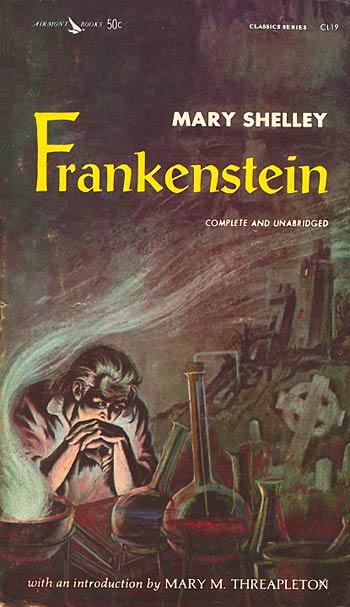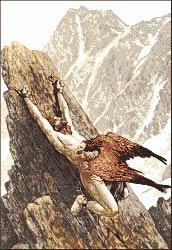Automata 101: Frankenstein’s Monster as Golem
Rhonda Knight is an Associate Professor of English at Coker College in Hartsville, SC. She teaches Medieval and Renaissance literature as well as composition courses. This blog will outline her experiences teaching an Honors English Composition course about created entities, beginning with the golem of Jewish legend and continuing through cyborgs, robots, androids, and artificial intelligence.
 Before we started reading Frankenstein, I wanted to introduce the students to many of the concepts we would work with this semester. For the first class, they listened to a children’s story, The Golem of Prague, and read a different account of it by Jacob Grimm. They also read Jorges Luis Borges’ poem “The Golem” and Biblical and Talmudic verses about the creation. Here’s a translation of Borges’ poem, though we used a different translation from Borges: Selected Poems in class.
Before we started reading Frankenstein, I wanted to introduce the students to many of the concepts we would work with this semester. For the first class, they listened to a children’s story, The Golem of Prague, and read a different account of it by Jacob Grimm. They also read Jorges Luis Borges’ poem “The Golem” and Biblical and Talmudic verses about the creation. Here’s a translation of Borges’ poem, though we used a different translation from Borges: Selected Poems in class.
These varied texts enabled us to list some parameters for the semester’s discussion on the board. The ones that I remember most clearly are:
- creation – magical, divine, scientific: where do they overlap? how can we tell?
- man playing God, creating the other, creating new Adams: what is the responsibility of the maker?
- importance of material in creation: clay, mud, dust, dirt. What other materials will we see?
- communication: why can some golems speak, others not? how will communication or lack of it figure in these texts?
We spent a lot of time working on the complex meaning of Borges’ last stanza:
“In that hour of dread and blurred light,
his eyes lingered on his Golem.
Who will tell us, what did God feel,
looking upon His rabbi in Prague?”
The class focused quickly on the lines’ various interpretations: Does God feel that He failed when He created man? Has He always felt this way? Did the rabbi’s making the Golem cause this feeling? Does this poem pose creation as positive and human or instead ambition as negative and taboo?
 All of this was a perfect set-up for Frankenstein, which we began the next class. Only about four of the seventeen students had read the book before, so much of our first discussion dealt with their surprise that the creature is not called Frankenstein and he’s not a green giant with bolts in his neck. I told the students that that particular image emerged from James Whale’s 1931 movie that starred Boris Karloff as the creature; however I did not know much more. After class, I found a great website that discusses Universal’s make-up artist, Jack Pierce’s, philosophy in designing the monster’s overall look. I posted the link on the course website, and we discussed it a bit in the next class.
All of this was a perfect set-up for Frankenstein, which we began the next class. Only about four of the seventeen students had read the book before, so much of our first discussion dealt with their surprise that the creature is not called Frankenstein and he’s not a green giant with bolts in his neck. I told the students that that particular image emerged from James Whale’s 1931 movie that starred Boris Karloff as the creature; however I did not know much more. After class, I found a great website that discusses Universal’s make-up artist, Jack Pierce’s, philosophy in designing the monster’s overall look. I posted the link on the course website, and we discussed it a bit in the next class.
The students were also surprised that there’s so little discussion of how Victor Frankenstein made the creature. We discussed how this is often considered the first science fiction novel even though it contains very little science. (The WWEnd forum has a good discussion about early science fiction.) We spent some time differentiating the kinds of science that does appear in the book. Interestingly, Shelley’s introduction provides some details of her vision concerning Frankenstein’s use of engines and galvanism in the animation of the creature. Those details are glossed over in the novel. Nevertheless, Shelley very carefully poses the new Enlightenment sciences of chemistry and anatomy against medieval and Renaissance notions of alchemy. Of course, the irony is that the combination of both types of knowledge allows Frankenstein to do the unthinkable and create life.
 We decided that Shelley’s paucity of science indicates that she’s not really interested in the “how” but in what happens after the creation. I focused them on the novel’s subtitle, The Modern Prometheus, as a way to discuss the book’s role as a cautionary tale against scientific overreaching. Most of them knew that Prometheus brought fire to man in Greek mythology. However, they did not know that in some myths he created mankind from clay and water; this, of course, brought us back to the golem stories. Some remembered that Prometheus’ punishment was to have his internal organs eaten by vultures each day and then they would regenerate at night so that they could be eaten again in an eternal cycle of punishment. We compared this physical punishment to Victor Frankenstein’s mental anguish. I was proud that several of them made the connection between Frankenstein and his interlocutor, Captain Walton, as men whose scientific curiosity could lead to their anguish and destruction.
We decided that Shelley’s paucity of science indicates that she’s not really interested in the “how” but in what happens after the creation. I focused them on the novel’s subtitle, The Modern Prometheus, as a way to discuss the book’s role as a cautionary tale against scientific overreaching. Most of them knew that Prometheus brought fire to man in Greek mythology. However, they did not know that in some myths he created mankind from clay and water; this, of course, brought us back to the golem stories. Some remembered that Prometheus’ punishment was to have his internal organs eaten by vultures each day and then they would regenerate at night so that they could be eaten again in an eternal cycle of punishment. We compared this physical punishment to Victor Frankenstein’s mental anguish. I was proud that several of them made the connection between Frankenstein and his interlocutor, Captain Walton, as men whose scientific curiosity could lead to their anguish and destruction.
The paragraphs above represent only a fraction of issues that arose in class: we also discussed the Edenic/pastoral overtones of the creature’s desires, the role of the Industrial Revolution in Shelley’s work, and Frankenstein as a romantic hero.
I think Frankenstein was a good place to begin our discussion. The novel makes a good foundation for future discussions about the role of responsibility in scientific discovery. The students seemed very grounded in their understanding of the issues we will be exploring. I’m glad they gained that confidence because next up is E.T.A. Hoffman, who is always a bit disjointed and perplexing.
@WWEnd I wonder, will Dr. Knight get to Marge Piercy's He, She & It (Body of Glass) in this course? I hope so…
— Margo-Lea Hurwicz (@MangoHeroics) June 13, 2013



















 Full Details
Full Details


3 Comments
It’s an interesting comparison you make between Prometheus and Dr. Frankenstein, but I should think I’d wind up drawing more a contrast. Prometheus was a titan, after all, who was not dealing with an element that was beyond him, and was metaphorically giving the gift of knowledge via the flame. Fire, as it turns out, was a boon for mankind. It was only the jealousy of Zeus, who didn’t want to compete with man, that condemned Prometheus. Dr. Frankenstein, on the other hand, was overreaching to give a gift to his own species. Surely he did fancy himself a modern Prometheus, but turned out to be closer to Icarus. Then again, perhaps the knowledge that Prometheus’ fire bestows ultimately leads to our own overreach. Perhaps this the point of the Genesis author when he chides man for eating from the tree of knowledge. It’d be interesting to speculate on whether man’s disobedience in the garden can be linked to golems in the same way that Shelley links the gift of fire to Dr. Frankenstein’s scientific hubris.
Rico,
While we were not doing absolute one-to-one comparisons, we did talk about the use/bestowal of technology (creation of life/fire,etc) as a something that brings the wrath of the god. We all agreed that Prometheus’ act was the more noble and even understandable. In thinking about your response, I see that there’s room to discuss the "modern" qualification of the subtitle even more. Victor’s reaction and punishment are so typically Gothic/Romantic in their conception and portrayal: Victor’s anguish and self-loathing are almost palpable; his lack of responsibility for his use of technology rivals the actions of factory owners in the Industrial Revolution, etc. You’d be surprised how often these texts lead us back to the Garden of Eden.
Professor Knight,
You have a request on Twitter that I embedded in your blog post.
Sorry, the comment form is closed at this time.